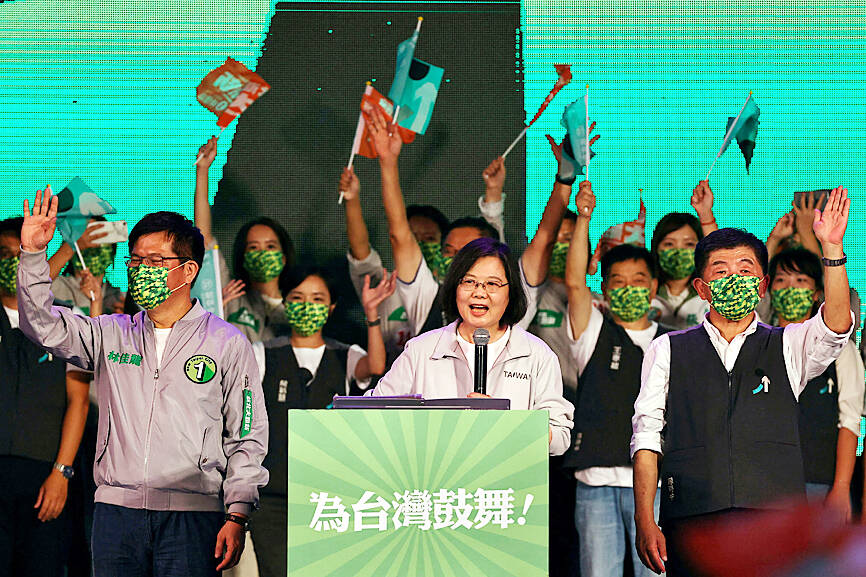President Tsai Ing-wen (蔡英文) yesterday suggested that tomorrow’s local elections should be considered a referendum on her leadership, saying a vote for Democratic Progressive Party (DPP) candidates would be an affirmation of her commitment to “take good care” of Taiwan and ensure peace with China.
The elections for city mayors, county commissioners, local councilors and borough wardens are ostensibly about domestic issues, and those elected do not have a direct say on national policies.
However, Tsai has reframed the campaign to put relations with China front and center.

Photo: Ann Wang, Reuters
Tsai said in a video message that voting for DPP candidates was the same as voting for her.
“If you have not yet decided which city or county commissioner candidate to vote for, then I ask you to please cast this vote for me, for candidates I am recommending,” she said.
“Thank you for choosing Tsai Ing-wen the last time around, and I believe that I can take good care of Taiwan,” she added. “I am also very conscientious and responsible about Taiwan getting a firm footing internationally, and committed to maintaining peace and stability across the Taiwan Strait.”
The election is happening a month after the end of the 20th National Congress of the Chinese Communist Party, where Chinese President Xi Jinping (習近平) secured an unprecedented third term in office — a point Tsai has repeatedly made on the campaign trail.
The Chinese Nationalist Party (KMT), which crushed the DPP in the 2018 local elections, has said it also is committed to protecting the nation’s democracy and freedom, but it has criticized the DPP for being overly confrontational with China.
Former president Ma Ying-jeou (馬英九), who remains a senior KMT member, wrote on Facebook yesterday that voting for the DPP could bring war, and supporting the KMT would ensure peace.
"Choose peace and reject war!" he wrote.
Tsai has repeatedly offered to talk to Beijing on the basis of equality and respect, but has been rebuffed.

The manufacture of the remaining 28 M1A2T Abrams tanks Taiwan purchased from the US has recently been completed, and they are expected to be delivered within the next one to two months, a source said yesterday. The Ministry of National Defense is arranging cargo ships to transport the tanks to Taiwan as soon as possible, said the source, who is familiar with the matter. The estimated arrival time ranges from late this month to early next month, the source said. The 28 Abrams tanks make up the third and final batch of a total of 108 tanks, valued at about NT$40.5 billion

Two Taiwanese prosecutors were questioned by Chinese security personnel at their hotel during a trip to China’s Henan Province this month, the Mainland Affairs Council (MAC) said yesterday. The officers had personal information on the prosecutors, including “when they were assigned to their posts, their work locations and job titles,” MAC Deputy Minister and spokesman Liang Wen-chieh (梁文傑) said. On top of asking about their agencies and positions, the officers also questioned the prosecutors about the Cross-Strait Joint Crime-Fighting and Judicial Mutual Assistance Agreement, a pact that serves as the framework for Taiwan-China cooperation on combating crime and providing judicial assistance, Liang

A group from the Taiwanese Designers in Australia association yesterday represented Taiwan at the Midsumma Pride March in Melbourne. The march, held in the St. Kilda suburb, is the city’s largest LGBTQIA+ parade and the flagship event of the annual Midsumma Festival. It attracted more than 45,000 spectators who supported the 400 groups and 10,000 marchers that participated this year, the association said. Taiwanese Designers said they organized a team to march for Taiwan this year, joining politicians, government agencies, professionals and community organizations in showing support for LGBTQIA+ people and diverse communities. As the first country in Asia to legalize same-sex

MOTIVES QUESTIONED The PLA considers Xi’s policies toward Taiwan to be driven by personal considerations rather than military assessment, the Epoch Times reports Chinese President Xi Jinping’s (習近平) latest purge of the Chinese People’s Liberation Army (PLA) leadership might have been prompted by the military’s opposition to plans of invading Taiwan, the Epoch Times said. The Chinese military opposes waging war against Taiwan by a large consensus, putting it at odds with Xi’s vision, the Falun Gong-affiliated daily said in a report on Thursday, citing anonymous sources with insight into the PLA’s inner workings. The opposition is not the opinion of a few generals, but a widely shared view among the PLA cadre, the Epoch Times cited them as saying. “Chinese forces know full well that